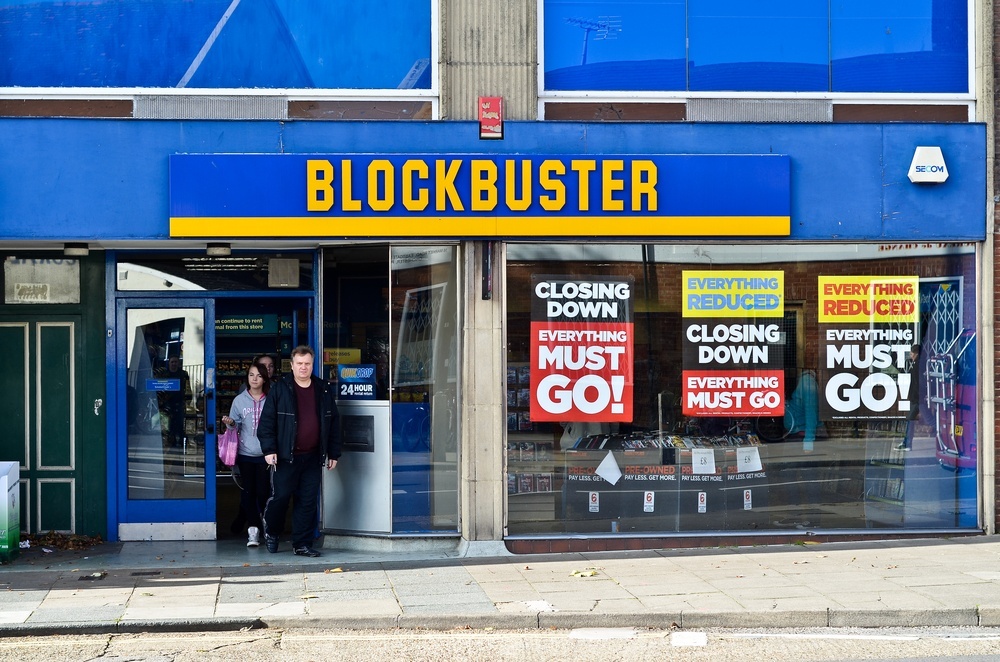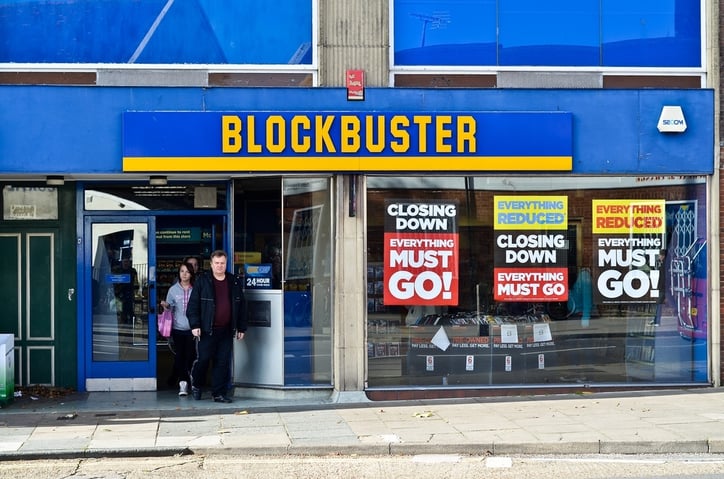Missouri Marketing Resource Blog

How Your Business Can Avoid “The Blockbuster Syndrome”

“Redbox should have been created by Blockbuster. Air BNB should have been created by Marriott. Uber should have been created by Greyhound. If you don’t wake up every morning and try to put yourself out of business, then someone else is going to come along and do it for you.”
-Gary Vaynerchuk
Gary with the mic drop.
Honestly though, let’s observe a quick moment of silence in honor of businesses (like Blockbuster) who were forced down a speedy descent into irrelevance by newer, updated, and more innovative companies (like Redbox and Netflix).

In today’s world, “disruptive” businesses like Air BNB, Redbox, Netflix, and Uber are coming into existence daily and in turn, sending businesses with outdated concepts down the same, fateful slope into irrelevance. We’re calling this “The Blockbuster Syndrome” and we’re here to help keep your business from falling victim.
Change Is The Only Constant
Late sixth century philosopher, Heraclitus, never got to rent a movie from a big red box or summon a chariot to give him a ride across Greece. He did, however, understand that thought-shifting changes like these should always be expected. Heraclitus famously stated that “the only thing that is constant is change” and throughout the centuries, this claim has been justified.
The first step in safeguarding against “The Blockbuster Syndrome” is to normalize the reality that change is going to happen. Once this truth is fully accepted, then your business can ease up on the reigns of the past and look forward to future changes that should alter the way you do things.
The Small Business Advantage
Larger corporations have hundreds of complicated intricacies they call “policies” and “procedures.” While these definitely serve a respectable purpose, they can also be restrictive and put their management teams in quite a bind. In contrast, the management teams (and employees) of less rigid small businesses possess much more freedom to adapt to changes and innovate accordingly. This way, when “disruptive” companies come along and set new industry precedents, drastic changes will be much easier to tackle for these teams with more flexibility. Or who knows? Maybe your small business will have the freedom (and the genius) to become the next “disruptor” business!
Tips for Avoiding “The Blockbuster Syndrome”
Now that we’ve introduced the ideal mindset that businesses should possess regarding change and we’ve pointed out the advantage that small businesses have in the game, it’s time to discuss some practical ways that your business can avoid falling into stagnancy and subsequently, irrelevance.
1. Be on the lookout for disruptions.
In many cases similar to the fall of Blockbuster, the writing was on the wall for quite some time. However, for whatever reason, this foreshadowing was ignored until eventually, it was too late to salvage the situation.
Your business can avoid this by paying careful attention to competing businesses, both big and small, to observe any new ideas that they are implementing. It is also wise to closely take note of other worldviews, particularly younger generations. If your business has Millennial employees, don’t be too proud to regularly ask them about new trends they have noticed.
Another effective way to be on the lookout for potential disruptions is to use all of your employees as a resource and conduct regular “future-focused brainstorm sessions.” In these meetings, all ideas are welcome and no idea is a bad one. Brainstorm what potential changes could occur in your market and industry and decide how your business could adapt to them when, and if, these transpire.
2. Help your customers positively respond to change.
Let’s face it: When Uber first made its debut, we all were a little horrified at the concept.

But now, Uber regularly services more than 40 million monthly riders! It’s safe to say that the trend is mostly well-received.
There is always a chance that new changes to your products or services may not be warmly welcomed by your current customers. Help these individuals respond positively to updates and new trends by proving the worth of these new changes. Similar to Uber, dispel the public’s fear of the unknown by demonstrating the convenience, helpfulness, and simplicity of your business’ updates. The extra effort will be worth it in the end when you successfully convert your current customers and attract new prospects due to your modernized services.
3. Expect surprises!
Anticipate that some new market trends will appear too far-fetched. No matter what it may seem like at first glance, determine to be open to the idea of change. Closed-mindedness will end up harming your business more than adopting a new trend will.
Commit to thinking “outside of the box” and taking other points of view into consideration, especially when it comes to younger perspectives. Expect that mistakes will happen while your business attempts to innovate, so go ahead and get accustomed to trial and error. That way, when you do fail, you can get back up, dust yourself off, and go back to innovating, unfazed by it all.
Avoid “The Blockbuster Syndrome” by determining to be different and get ahead of the trends. Or, better yet, dare to disrupt your industry yourself! Whatever you do, "be kind, please (don't) rewind." Think futuristically and watch your business thrive!

